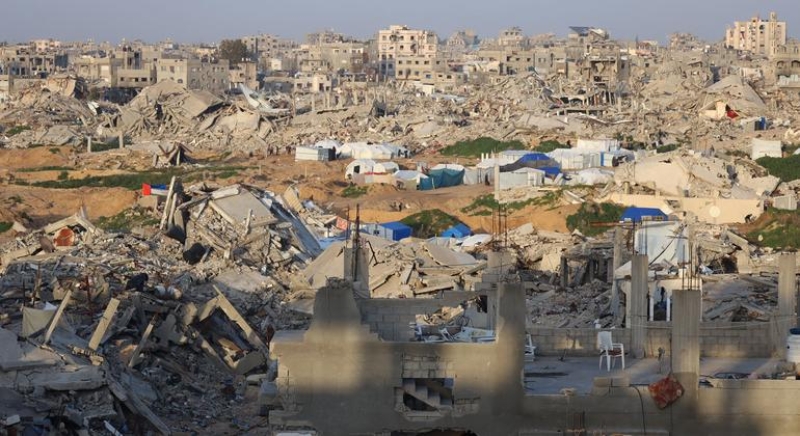News update
- Bhutan’s Tala Dam Overtopped after unprecedented rainfall |
- Bangladesh’s Coastal Fishers Trapped by Debt, Climate Change |
- 3 US physicists win Nobel for quantum tunneling research |
- Bangladesh economy rebounds strongly in latter half of FY25: WB |
- Tarique urges teachers to back BNP for reform-focused govt |
Two Years On, Gaza-Israel War Brings Indescribable Pain
GreenWatch Desk:
International
2025-10-07, 10:54pm

Hostages taken during the 7 October raid by Hamas on Israel are still being held in Gaza.
As the Gaza-Israel war enters its third year—sparked by Hamas-led terror attacks on Israel—the United Nations is appealing for the release of all hostages, an immediate ceasefire, and a surge in aid to alleviate Palestinians’ suffering. The appeal comes as talks on a US-driven peace plan continue in Egypt.
“The pain is indescribable,” said UN relief chief Tom Fletcher on the anniversary of the “abhorrent” attacks.
“I renew my call for the unconditional, immediate release of all hostages—and until then, they must be treated humanely. Civilians everywhere must be protected.”
Mr. Fletcher emphasized that since 7 October 2023, tens of thousands of Palestinians have been killed, and “hundreds of thousands endure starvation and displacement.”
Calls for Ceasefire and Accountability
Philippe Lazzarini, Commissioner-General of the UN agency for Palestinian refugees (UNRWA), said Gazans have endured “two long years of destruction, displacement, bombardment, fear, death and hunger.”
In a statement posted on X, he again called for the release of all hostages and Palestinian detainees, an immediate ceasefire, and unrestricted delivery of humanitarian aid through UNRWA.
He also urged accountability for atrocities committed on and after 7 October 2023, saying there was “no other way out of this abyss and mayhem.”
7 October Terror
More than 1,250 Israelis and foreign nationals were killed in the Hamas-led terror attacks on 7 October 2023, and over 250 others were taken hostage.
Since then, more than 66,000 Palestinians have been killed in the war in Gaza, according to local health authorities.
UN humanitarian and health officials said on Tuesday that children are paying the heaviest price, with tens of thousands killed, maimed or severely malnourished, while Gaza’s hospitals edge towards total collapse.
Child Deaths ‘Unacceptable’: UNICEF
Speaking in Geneva, Ricardo Pires from the UN Children’s Fund (UNICEF) said Israel’s “disproportionate response” had left children suffering “in their bodies and minds for far too long.”
He reported that 61,000 children have been killed or maimed since October 2023—one child every 17 minutes—and many have been traumatized, orphaned, and displaced multiple times.
“They’ve been exposed to disease and violence on a scale unprecedented for Gaza,” he said.
“We’ve been denied permission to bring incubators and ventilators to children in the north. They’re sharing oxygen masks to survive.”
UNICEF says one in five babies in Gaza is now born prematurely, often to mothers weakened by hunger and stress.
Referring to the peace plan proposed by US President Donald Trump, which has been the focus of negotiations in Egypt for a second day, Mr. Pires welcomed “the plans by the US Government which bring a glimpse of hope for civilians and children in Gaza.”
His remarks echoed those of UN Secretary-General António Guterres, who said on Monday that the US proposal “presents an opportunity that must be seized to bring this tragic conflict to an end.”
“After two years of trauma, we must choose hope—now,” the UN chief urged.
Hospitals on the Brink
According to the World Health Organization (WHO), only 14 of Gaza’s 36 hospitals are still partially operating—none in the north—and just 62 of 176 primary health-care centres remain functional.
WHO spokesperson Christian Lindmeier reported that 400 malnutrition-related deaths have been confirmed since January 2025, including 101 children, 80 of them under five. Over 10,000 children have been diagnosed with acute malnutrition in the past two months, with around 2,400 severely malnourished children at risk of starvation.
He warned the real toll is likely higher, as many families in overcrowded shelters cannot reach clinics or hospitals.
“Famine once confined to Gaza City is now spreading south as people flee renewed fighting,” he said.
Aid Still Blocked and Unpredictable
Jens Laerke, spokesperson for the UN humanitarian coordination office (OCHA), said that since October 2023, more than 8,000 aid missions inside Gaza have required Israeli approval—and nearly half have been denied, delayed, or impeded.
“Any aid that gets in is positive,” he said, “but there hasn’t been a single day where supplies met the required levels.”

